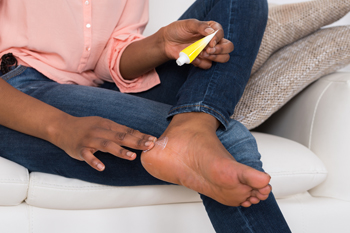
Heel fissures, or cracked skin on the heels, develop when the feet lack adequate moisture. This can lead to the development of painful cracks and dry patches on the outer edge of the heels. While heel fissures are often perceived as a cosmetic concern, they can escalate into more serious health conditions, underscoring the importance of timely treatment. Common causes of heel fissures include wearing open-backed shoes, living in dry climates, walking barefoot, obesity, and having inactive sweat glands. In cases of persistent or severe fissures, seeking professional help from a podiatrist is suggested. Treatment measures can provide a comprehensive approach to alleviate discomfort and expedite the healing process. The danger of heel fissures is particularly important for diabetic people and patients with neuropathy and should not be ignored. If you have developed seriously cracked heels that are bleeding or may have become infected, it is suggested that you schedule an appointment with a podiatrist as quickly as possible for an exam and treatment.
Cracked heels are unsightly and can cause further damage to your shoes and feet. If you have any concerns, contact Imaze Marian Davis, DPM from Marian Davis, DPM, PA. Our doctors can provide the care you need to keep you pain-free and on your feet.
Cracked Heels
Cracked heels appear unappealing and can make it harder for you walk around in sandals. Aside from looking unpleasant, cracked heels can also tear stockings, socks, and wear out your shoes. There are several methods to help restore a cracked heel and prevent further damage.
How Do You Get Them?
Dry skin is the number one culprit in creating cracked heels. Many athletes, walkers, joggers, and even swimmers suffer from cracked heels. Age and skin oil production play a role to getting cracked heels as well.
Promote Healing
Over the counter medicines can help, especially for those that need instant relief or who suffer from chronic dry feet.
Wear Socks – Wearing socks with medicated creams helps lock in moisture.
Moisturizers – Applying both day and night will help alleviate dryness which causes cracking.
Pumice Stones – These exfoliate and remove dead skin, which allows for smoother moisturizer application and better absorption into the skin.
Change in Diet
Eating healthy with a well-balanced diet will give the skin a fresh and radiant look. Your body responds to the kinds of food you ingest. Omega-3 fatty acids and zinc supplements can also revitalize skin tissue.
Most importantly, seek professional help if unsure how to proceed in treating cracked heels. A podiatrist will help you with any questions or information needed.
If you have any questions, please feel free to contact our office located in Miami, FL . We offer the newest diagnostic and treatment technologies for all your foot care needs.

